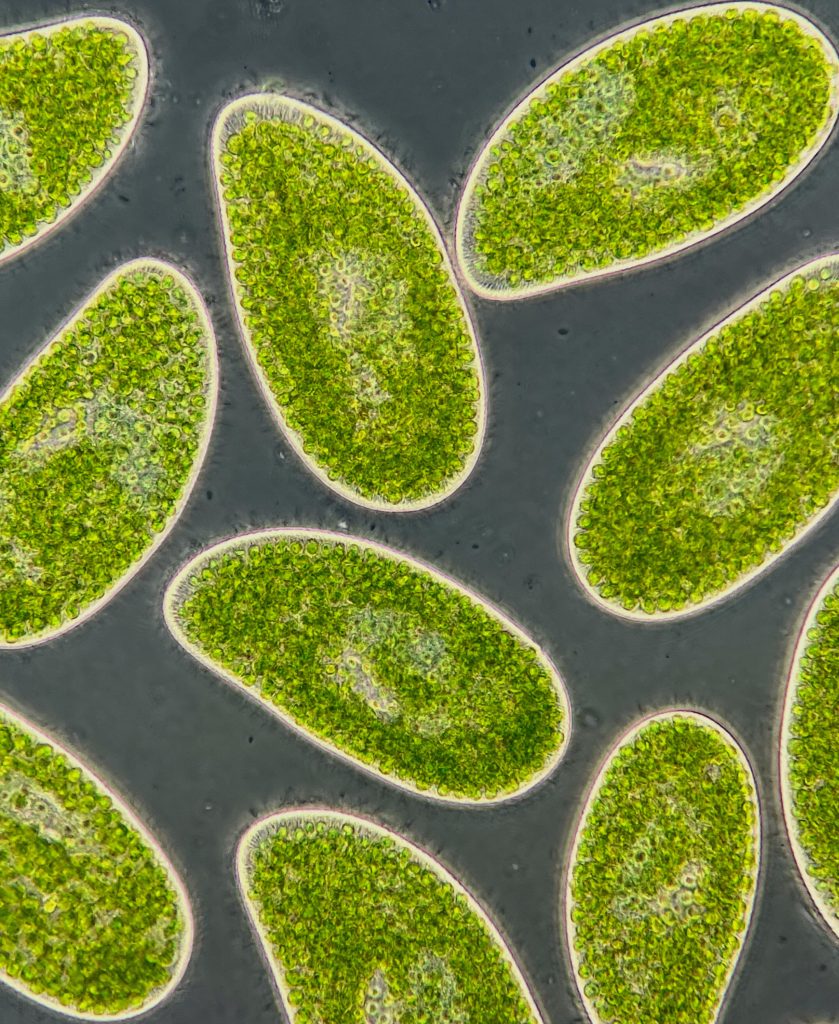The mixotrophic protist Paramecium bursaria can eat bacteria or use photosynthesis to get energy and carbon. Photosynthesis occurs inside the endosymbiotic Chlorella algae (green spheres) that live inside P bursaria cells. Credit: Daniel Wieczynski
New research finds that a warming climate could flip globally abundant microbial communities from carbon sinks to carbon emitters, potentially triggering climate change tipping points. The findings are published in Functional Ecology.
Mixotrophic microbes are organisms that can switch between photosynthesizing like plants (absorbing carbon dioxide) and eating like animals (releasing carbon dioxide). They are globally abundant, commonly found in freshwater and marine environments, and estimated to make up the majority of marine plankton.
By developing a computer simulation that modeled how mixotrophic microbes acquire energy in response to warming, researchers at Duke University and the University of California Santa Barbara, have found that under warming conditions, mixotrophic microbes shift from being carbon sinks to carbon emitters.
The findings mean that as temperatures increase, these highly abundant microbial communities could change from having a net cooling effect on the planet to a net warming effect.
The mixotrophic protist Paramecium bursaria can eat bacteria or use photosynthesis to get energy and carbon. Photosynthesis occurs inside the endosymbiotic Chlorella algae (green spheres) that live inside P bursaria cells. Credit: Daniel Wieczynski, CC BY
Dr. Daniel Wieczynski of Duke University and lead author of the study said, “Our findings reveal mixotrophic microbes are much more important players in ecosystem responses to climate change than previously thought. By converting microbial communities to net carbon dioxide sources in response to warming, mixotrophs could further accelerate warming by creating a positive feedback loop between the biosphere and the atmosphere.”
Dr. Holly Moeller of University of California Santa Barbara and co-author of the study added, “Because mixotrophs can both capture and emit carbon dioxide, they are like ‘switches’ that could either help reduce climate change or make it worse. These bugs are tiny, but their impacts can really scale up. We need models like this to understand how.”
Dr. Jean-Philippe Gibert of Duke University and another co-author of the study said, “State-of-the-art predictive models of long-term climate change currently only account for microbial action in an extremely reductive, partial, or sometimes plain wrong fashion. Research like this is therefore much needed to improve our broader understanding of the biotic controls on Earth’s atmospheric processes.”
An early warning system
The researchers’ model also revealed that right before mixotrophic microbe communities switch to emitting carbon dioxide, their abundance starts to fluctuate wildly. These changes could be detected in nature by monitoring mixotrophic microbe abundance and offers hope that these microbes could act as early warning signals for climate change tipping points.
Dr. Wieczynski said, “These microbes may act as early indicators of the catastrophic effects of rapid climate change, which is especially important in ecosystems that are currently major carbon sinks like peatlands, where mixotrophs are highly abundant.”
However, the researchers also found these early warning signals can be muted by increases of nutrients like Nitrogen to the environment, typically caused by run off from agriculture and wastewater treatment facilities.
When higher amounts of such nutrients were included in the simulations, the researchers found that the range of temperatures over which the tell-tale fluctuations occur starts to shrink until eventually the signal disappears and the tipping point arrives with no apparent warning.
“Detecting these warning signs is going to be challenging. Especially if they’re getting more subtle with nutrient pollution.” Said Dr. Moeller. “However, the implications of missing them are huge. We could wind up with ecosystems in a much less desirable state, adding greenhouse gases to the atmosphere instead of removing them.”
In the study, the researchers ran simulations using a 4-degree span of temperatures, from 19 to 23 degrees Celsius. Global temperatures are likely to surge 1.5 degrees Celsius above pre-industrial levels within the next five years, and are on pace to breach 2 to 4 degrees before the end of this century.
The researchers caution that the mathematical modeling used in the study draws on limited empirical evidence to investigate the effects of warming on microbial communities. Dr. Wieczynski said, “Although models are powerful tools theoretical results must ultimately be tested empirically. We strongly advocate for further experimental and observational testing of our results.”
More information: Daniel Wieczynski et al, Mixotrophic microbes create carbon tipping points under warming, Functional Ecology (2023). DOI: 10.1111/1365-2435.14350
Provided by British Ecological Society
Citation: Warming climate could turn ocean plankton microbes into carbon emitters (2023, June 1) retrieved 1 June 2023 from https://phys.org/news/2023-05-climate-ocean-plankton-microbes-carbon.html
This document is subject to copyright. Apart from any fair dealing for the purpose of private study or research, no part may be reproduced without the written permission. The content is provided for information purposes only.

